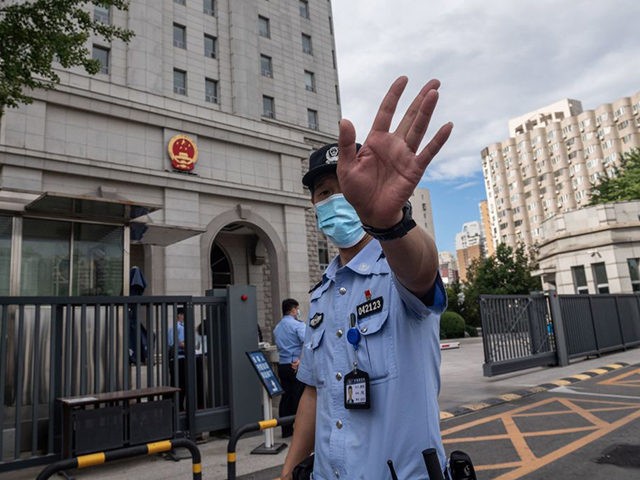Chinese property tycoon Ren Zhiqiang reportedly pleaded not guilty at his trial for bribery and abuse of power on Friday — If convicted on all charges, he would most likely face 5-10 years in prison, although he could receive a death sentence.
The corruption charges against Ren came after he wrote an open letter considered insulting to China’s authoritarian president-for-life, Xi Jinping.
According to Radio Free Asia (RFA), proceedings at the Beijing No. 2 Intermediate People’s Court were as murky as ever, but the few observers permitted through tight security agreed that Ren seems to be headed for prison:
“He didn’t request a defense attorney, but defended himself,” a family member of another dissident told RFA on Friday, adding that there weren’t many places available to family members to sit in the gallery during the trial.
“Ninety-nine percent of the small number of places for family members were taken up by officials from the court, prosecution, and other departments,” the family member said.
Veteran political journalist Gao Yu confirmed the report.
Gao said that he expected “5-10 years, or maybe even more” in prison for Ren.
Sources in Beijing compared Ren’s trial to that of Nobel Peace Prize laureate Liu Xiaobo, a survivor of the 1989 Tiananmen Square massacre who spent much of the rest of his life in prison and died of complications from liver cancer in 2017 amid allegations that the Chinese state thwarted his medical treatments.
“Ren Zhiqiang’s trial has attracted a lot of public attention inside China, because he is a princeling who dared to oppose [Xi Jinping]. He’s obviously a man of conscience,” journalist Zhang Ying told RFA.
Ren was supposedly expelled from the Chinese Communist Party (CCP) in July, and indicted soon thereafter, for misappropriating Party funds and abusing his authority as a CCP official. Even the earliest CCP denunciations of Ren made it clear his dissent from political orthodoxy was a major issue, blasting him for “smearing the party and country’s image, distorting the party and the military’s history, being disloyal and dishonest with the party.” The CCP was also visibly frustrated with his refusal to confess his guilt.
Ren’s real “crime” was writing a letter in March that criticized his government’s handling of the coronavirus pandemic, castigating the leadership for spending more time on political spin control and suppressing free speech than dealing with the disease. He charged Communist Party politics and speech controls with helping the virus to spread and accused the CCP of concealing the true origins of the pandemic.
“The reality shown by this epidemic is that the party defends its own interests, the government officials defend their own interests, and the monarch only defends the status and interests of the core,” his letter said.
“I see not an emperor standing there exhibiting his ‘new clothes,’ but a clown who stripped naked and insisted on continuing to be an emperor,” Ren wrote in the passage that most likely doomed him.
A previous public break with CCP orthodoxy cost Ren his account on Weibo, China’s version of Twitter; this time Ren disappeared entirely after writing his letter, held incommunicado and without formal charges for months. RFA cited reports that Xi was “furious” at Ren’s letter, viewing it as “an act of defiance against me” even though he was not called out by name in the missive.
On Monday, the UK Express cited Ren’s persecution as one of several signs that Xi is growing nervous about the possibility of a coup:
Speaking to Express.co.uk Tahir Imin, founder of Uighur Times Agency in Washington DC, said: “He is the only leader on the planet who has taken more than 11 leading positions in central government”. Cai Xia, a former CCP Party school professor who was expelled from the Chinese Communist Party, CCP, for her criticism of Xi, said to FRA Chinese last month: “There is a very strong challenge to Xi within the CCP, he knows that and if the US continues to give pressure on the Chinese economy, the CCP central committee might consider to replace him.” The president wants to consolidate the country’s security apparatus under his control ahead of the 2022 national congress.
Officials that show less than complete loyalty to the president will need swift Mao-style “education and rectification.”
The new mantra across all agencies is to “obey Xi in everything.”
Ren’s importance as a symbol of resistance to Xi and the CCP elite flows from his solid political background, as the South China Morning Post (SCMP) noted:
Ren was born into a revolutionary family, and his father Ren Quansheng was a former vice-minister of commerce. With his family connections and wealth, Ren was considered influential among political and business elites.
Media reports and published memoirs have documented his friendships with senior Chinese officials, some of whom have contributed forewords to books he has published.
The arrest has triggered widespread discussion about the limits on political speech even for those in elite circles.
Cai Xia, a former professor with the Central Party School, was expelled from the party after penning an article in July in defence of Ren. Now in the United States, Cai called Ren “the firmest and the most outstanding member of a group dedicated to pushing forward constitutional democracy” in China.
According to the SCMP, Ren still has not been allowed to meet with lawyers hired by his family. Whether he serves as his own counsel or not, Chinese courts rarely acquit defendants of political corruption charges.

COMMENTS
Please let us know if you're having issues with commenting.